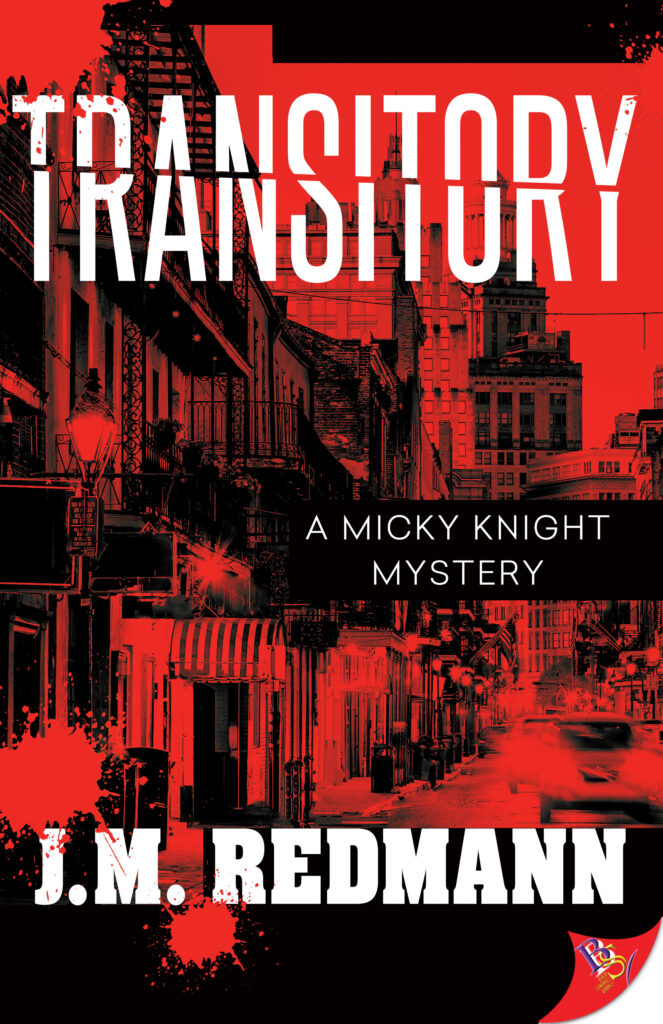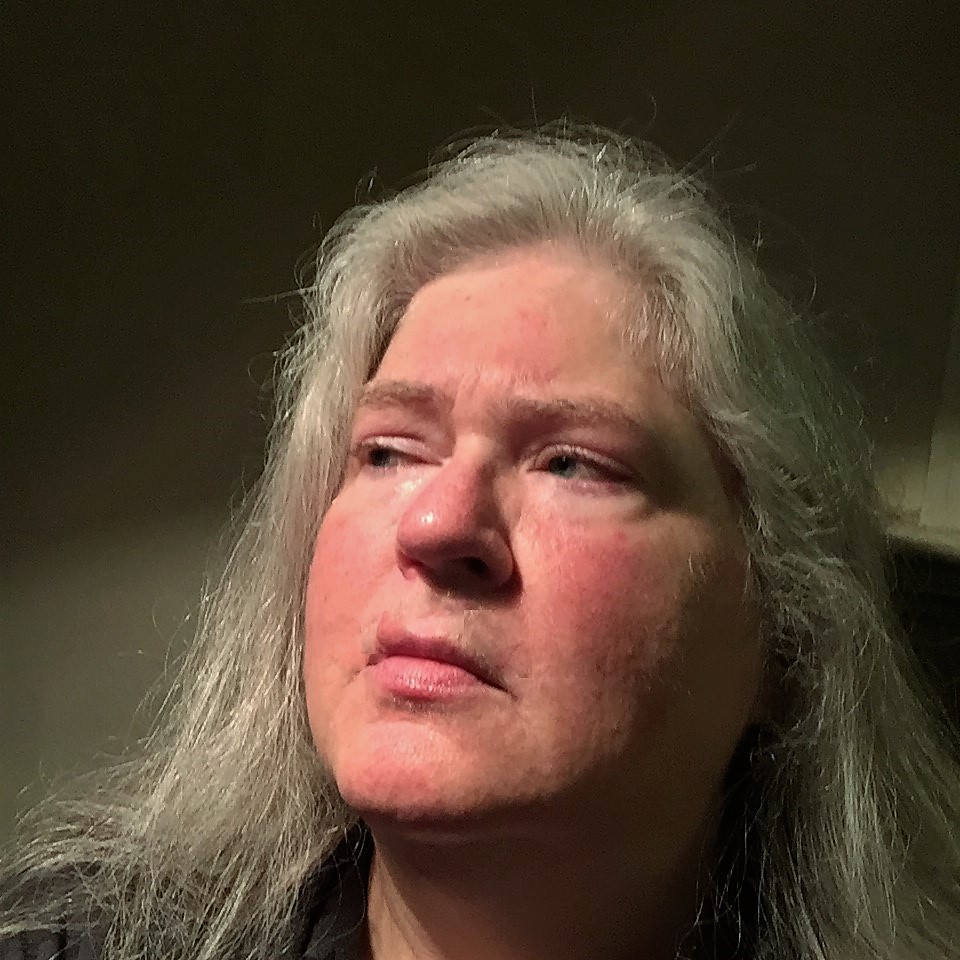Hardboiled lesbian detective author’s Black trans mystery novel
This month J.M. Redmann brings us the eleventh Micky Knight mystery, Transitory.
In Transitory cops blow it off, another Black transgender woman who surprised a customer with what was under the dress—bad luck she was pushed out of the car and then hit by another vehicle. But Micky Knight witnessed it, crossing the street at the right—or wrong—time, only yards away from what didn’t look at all like an accident to her. The woman was dressed more like a librarian than a sex worker.
J.M. Redmann has published ten novels featuring New Orleans PI Micky Knight. Her first book was published in 1990, one of the early hard-boiled lesbian detectives.


Queer Forty: Tell us about Micky Knight, the protagonist of your series.
J.M. Redmann: Michele Antigone Knight, known to her friends as Micky, was born in the bayou country outside of New Orleans, Louisiana. She had a rough childhood, her mother was a teenager who hadn’t chosen to be pregnant and had little choice but to marry the man Micky considers her father, a man much older than her mother. But her mother wasn’t content to remain in the bayous married to a man she didn’t love and left when Micky was around five. When she was ten, her father was killed in a car accident and Micky was taken in by an Aunt and Uncle living in the suburbs of New Orleans. It wasn’t a happy arrangement, the wild bayou child in this prim, proper family, and when she was eighteen, Micky left. With the help of a scholarship and some kind people, she went to college in New York City, the place that she knew her mother had moved to. But she never found her mother and after college came back to New Orleans.
She drifted around for a while, drinking too much, not able to find a job or career that really appealed to her. An out of the closet lesbian, Micky slept around a lot, but never really connected with anyone.
One job she ended up in was as a security guard for a warehouse. Her boss did some private detective work on the side and asked Micky to help him out several times. As they worked well together, he asked Micky to join him when he started his own agency. But he eventually wanted their relationship to be more than just professional, and Micky decided that it was time to move on. And so the M. Knight Detective Agency was born.
What drew you to writing? Why mysteries?
J.M. Redmann: Family values—my parents met as journalists on the same newspaper and they were both college educated (my mother the first in her family) so reading and books were always part of my growing up. They both wanted to be writers, too, but life never gave them the chance. I can’t really remember not wanting to be a writer, I was writing short stories in third grade. As to mysteries, I’ve always liked mysteries and read them. At the heart of mystery is the search for justice; who gets it and who deserves it. Let’s be real, part of was practical, it’s easier to sell a mystery both to publishers and to readers. Also, at the basis of most crime novels is death and dying, good and evil, and while it is possible to gloss over them, you can also really take a look at the kind of damage violence does, or how do we deal with grief and loss, and still be true to the genre. I like to point out to all my English major snob friends that Hamlet was a genre play, it has every convention of the revenge tragedy in it, from ghosts to body counts.
You’ve tackled some heavy issues in your work, including child abuse and violence against women. Was that a conscious choice, or did it just work within the context of the story?
J.M. Redmann: I’ve never sat down and thought ‘I want to tackle child abuse in this next book.’ To me, issues are what we look at from a far away vantage point, but it’s people’s lives when you live the everyday reality of it. Besides, the best way to ‘argue’ an issue is to simply tell the story of how it affects one person’s life. As a writer I search for the conflict, the rough patches and seek to explore who is she (or he), how does she deal with this, what are the consequences of the consequences—for example, what are the myriad ways that having a rough growing up affect someone twenty years later? How many places does this seep into your life? I have consciously tried to weave the cases that Micky takes with hot spots in her emotional life, because that way they echo each other and it forces her emotional terrain to be one of the mysteries to be solved.
What writers have influenced your work? Do you admire?
J.M. Redmann: Let me confess, I’m a reading slut. Books, magazines, the labels on toilet tissue . . .. Probably every writer I’ve read has influenced me—for good or ill. This will probably astound some people, but if I were stuck in that proverbial dessert island and could take one book, it would be Jane Austen’s Pride and Prejudice. (Unless I could stretch it and take something like the collected works of Shakespeare.) I think I admire every writer who has the courage to put the words on the paper—it can be so hard and scary and frustrating. But admire isn’t quite the same as read—so, in no particular order except the conjunctions of my fevered brain: Sara Paretsky, George Elliot, Dorothy Sayers, Barbara Wilson, Anton Chekov, Dorothy Allison, Charlotte Bronte, E. Annie Proulx, Kevin Allman, Greg Herren, Euripides, Octavia Butler, Anonymous, James Sallis, Doris Lessing, Walter Mosley, Sue Grafton, William Faulkner, Flannery O’Connor, Tennessee Williams, Louise Erdrich, Hannah Arendt, and many others I can’t think of at the moment.
How does it feel to have Micky called a “lesbian Kinsey Millhone”?
J.M. Redmann: It was meant as a compliment and I’ll take it as such, besides, it’s a hell of a lot better than some other things she could be called. Maybe someday some new detective will be called “the straight Micky Knight.”
Mickey has grown and changed through the course of the series. Has this reflected changes in your own life?
J.M. Redmann: Not in the least and of course. Micky’s struggles and changes do not directly reflect mine, but of course, my life influences my writing. I wasn’t interested in writing a static character, the Miss Marple who never changes from book to book, so in the first book Death by the Riverside, I started out with her as on the edge of being unlikable. And I knew that life was going to teach Mick a few lessons. One big overlap with my life and hers was Katrina in August of 2005. Every one in New Orleans was affected; the entire city evacuated, myself included. So Micky and her circle of friends had to experience it as well. I’ve let her age, although she hasn’t aged as relentlessly as I have.
How much of you is in Micky?
J.M. Redmann: That would be telling… Actually, anyone who knows me would tell you that I’m not Micky and they’re right. That’s part of the fun of writing her, I get to live a whole different life from my own boring, mundane existence. She can say the witty come-back in real time that took me three days to come up with.
Where have you lived and why chose New Orleans to set your books?
J.M. Redmann: Okay, the list: Biloxi, Mississippi, born there in 1955 and lived there until 1958. Then moved (my parents, actually) across the Biloxi Bay to Ocean Springs, Mississippi, lived there until 1973 when I went off to college. Poughkeepsie, NY, (Vassar College) from 1973 to 1977. New York City from 1977 to 1989. New Orleans, 1989 until 2022. Milwaukee, 2022 (what I did for love—my wife works here).
My father was a New Orleans native and we visited there often as a child. It was the big city to the small-town girl. That little French-Spanish strip of coast, from New Orleans to over where we were, was the world I grew into, the way I thought the light should slant, the smell of magnolias and moss, eating oysters and crawfish. I loved my life and time in the Northeast, but never felt grounded enough there to write a book set there. I knew it had to be a city and New Orleans was that city. Although I no longer live there, it is still the city of my heart and soul and, unless I live very long, the place I will have spent more years than any other. I know the city in ways I doubt I’ll ever know another city.
About J.M. Redmann
J.M. Redmann has published ten novels featuring New Orleans PI Micky Knight. Her first book was published in 1990, one of the early hard-boiled lesbian detectives. Her books have won three Lambda Literary awards. The Intersection Of Law & Desire was an Editor’s Choice of the San Francisco Chronicle and a recommended book by Maureen Corrigan of NPR’s Fresh Air. Two books were selected for the American Library Association GLBT Roundtable’s Over the Rainbow list and Water Mark won a ForeWord Gold First Place mystery award. She is the co-editor with Greg Herren of three anthologies, one of which, Night Shadows: Queer Horror, was shortlisted for a Shirley Jackson award. Her books have been translated into German, Spanish, Dutch, Hebrew and Norwegian.






